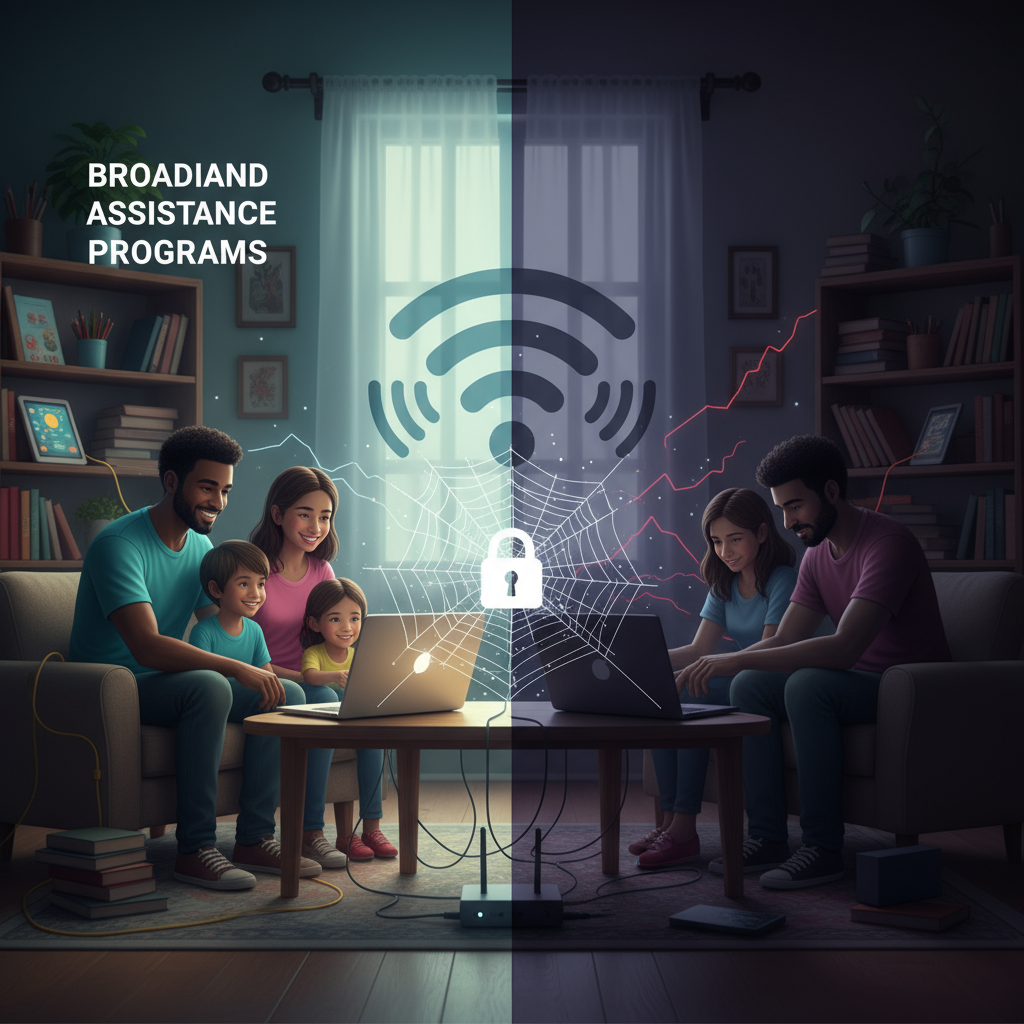The Digital Divide: Are We Making Broadband for the Poor Illegal?

Imagine a world where access to essential services like electricity or clean water was a luxury, not a right. Unthinkable, right? Yet, in our increasingly digital age, reliable and affordable internet access – broadband – has become just as critical. It’s the gateway to education, healthcare, job opportunities, and staying connected with loved ones. So, when headlines suggest that efforts to help low-income individuals afford this vital resource are facing legislative hurdles, it sends shivers down the spine. This isn’t just about internet access; it’s about equitable participation in modern society.
Recent reports indicate a concerning trend: legislative attempts that could, directly or indirectly, undermine or even outlaw government programs designed to bridge the digital divide. This isn’t about partisan politics in a superficial sense; it’s about fundamental questions of equity, opportunity, and the role of government in ensuring basic necessities in a 21st-century economy.
The Essential Role of Broadband Assistance Programs

For millions of Americans, the cost of broadband is a significant barrier. Programs like the Affordable Connectivity Program (ACP) were specifically designed to address this. The ACP, born out of the pandemic’s stark revelation of digital disparities, offered a monthly discount on internet service for eligible low-income households. This wasn’t charity; it was an investment in human potential and economic stability.
Consider the single parent whose child relies on online learning, the senior citizen needing telehealth appointments, or the aspiring entrepreneur trying to launch a business from their home. For these individuals, a $30 or $75 monthly discount isn’t just a saving; it’s the difference between connection and isolation, opportunity and stagnation. These programs acknowledge that in today’s world, broadband is not a luxury, but a utility. Without it, entire segments of the population are left behind, further exacerbating existing inequalities.
The Mechanics of Opposition: What’s Really Happening?
The precise methods vary, but the underlying goal appears consistent: to restrict or eliminate government involvement in subsidizing broadband for low-income populations. This can manifest in several ways:
- Defunding Existing Programs: The most direct approach is to simply cut funding for successful initiatives like the ACP when they come up for reauthorization. Without appropriations, these programs simply cease to exist, immediately cutting off vital support for millions.
- Imposing Restrictive Eligibility Criteria: Another strategy involves tightening eligibility requirements to such an extent that only a fraction of those who genuinely need assistance would qualify. This could involve complex bureaucratic hurdles or stricter income thresholds that don’t reflect the true cost of living.
- Legislative Prohibitions: The most extreme measure would be to pass laws explicitly making it illegal for federal or even state governments to subsidize broadband access for individuals. This would be a radical departure from current policy and could face significant legal challenges.
- Shifting Responsibility: Some arguments advocate for shifting the entire burden of providing affordable broadband onto internet service providers (ISPs) through mandates,
or suggesting that market forces alone should resolve the issue. While market innovation is important, relying solely on it has historically failed to address the needs of the most vulnerable.
These efforts often stem from a philosophy that views government assistance as an overreach, an inefficiency, or an unfair intervention in the free market. However, critics argue that in essential sectors like education, healthcare, and increasingly, internet access, market forces alone cannot ensure equitable access for all, especially for those in economically disadvantaged communities.
The Wider Implications: A Step Backward for Society
Should these efforts succeed, the repercussions would be severe and far-reaching:
- Exacerbating the Digital Divide: Millions would lose access, widening the gap between the digitally connected and the digitally excluded. This isn’t just an inconvenience; it’s a barrier to full participation in society.
- Hindering Education and Workforce Development: Students without reliable internet struggle with homework, remote learning, and accessing educational resources. Adults seeking new skills or job opportunities face similar limitations, hindering economic mobility.
- Impact on Health and Well-being: Telehealth appointments have become a lifeline for many, particularly in rural or underserved areas. Losing broadband access could severely impact healthcare outcomes.
- Economic Stagnation: A digitally excluded population translates to a less productive workforce and less participation in the digital economy. This isn’t just a concern for individuals; it impacts national economic growth.
- Undermining National Competitiveness: Other developed nations are actively investing in digital inclusion. If the U.S. retracts its efforts, it risks falling behind in global innovation and competitiveness.
This is not a hypothetical scenario; the threat is real. We are at a critical juncture where policy decisions will determine whether “broadband for all” remains an aspirational goal or becomes a fundamental right.
A Call to Action and Awareness
The potential legal challenges and policy debates surrounding broadband affordability highlight a deeper ideological battle about the role of government in social welfare and economic opportunity. It forces us to ask: do we believe that basic access to the digital world is a privilege for the wealthy, or a fundamental human right in the 21st century?
As concerned citizens, it’s crucial to stay informed, engage with our elected representatives, and advocate for policies that prioritize digital inclusion. The future of our society, our economy, and our collective well-being depends on ensuring that no one is left behind in the digital age. Let’s make sure that efforts to help poor people afford broadband are not just legal, but celebrated and strengthened.

